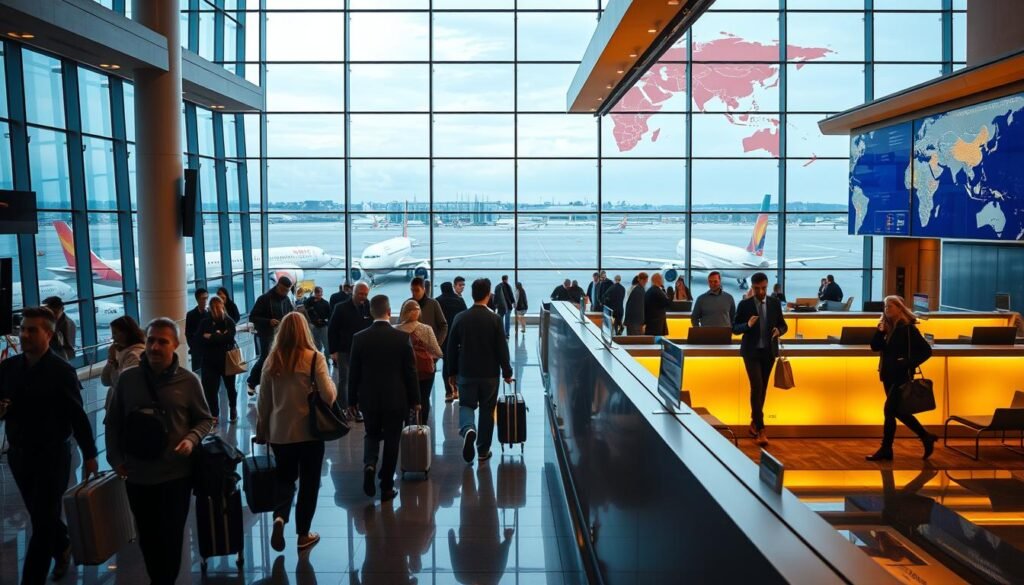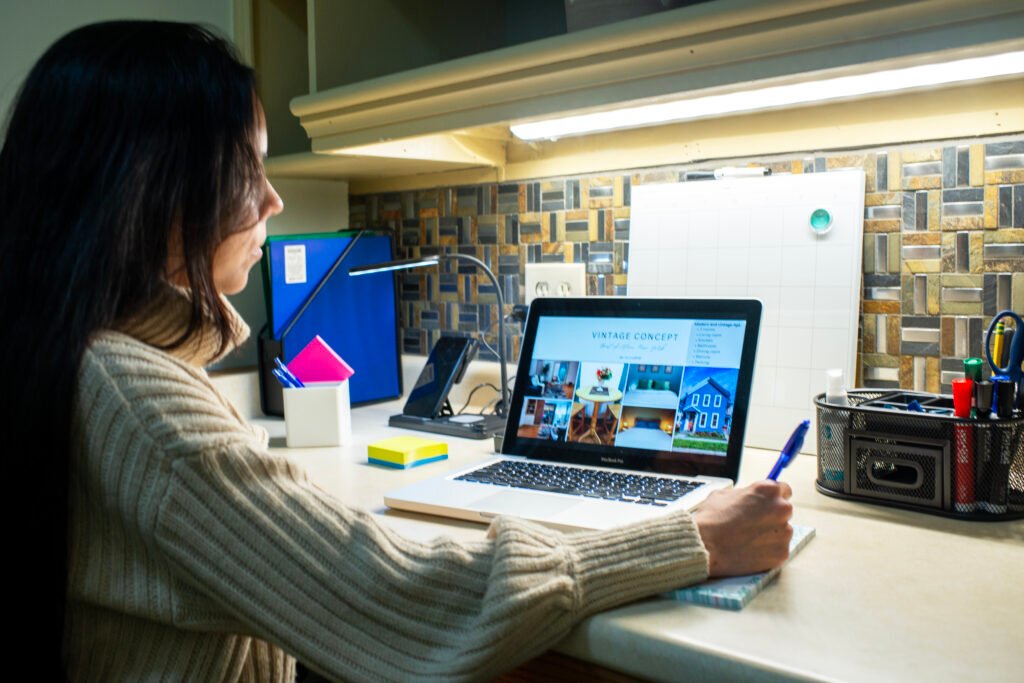In the ever-evolving landscape of the corporate world, the interplay between travels and business has become a critical component of success. Whether you’re a seasoned executive or a rising entrepreneur, navigating the complexities of business travel can make the difference between a thriving enterprise and one that struggles to keep pace. But what if there was a comprehensive guide to mastering the art of corporate travel? Imagine unlocking the secrets to fostering client relationships, exploring new markets, and maximizing productivity on the road. Welcome to your ultimate guide on the intersection of travels and business.
Key Takeaways
- Discover the essential strategies for planning and managing successful business trips
- Learn how to effectively build client relationships and explore new markets through travel
- Uncover practical tips for budgeting and tracking travel expenses
- Explore the importance of understanding different business cultures and navigating cultural norms
- Dive into the role of technology in enhancing the business travel experience
The Importance of Business Travel
Corporate travel plays a vital role in fostering client relationships and exploring new market opportunities. Face-to-face interactions with clients can help build trust, personalize interactions, and solidify partnerships. Traveling to new locations also allows businesses to gain firsthand insights into emerging markets and identify potential growth opportunities.
Fostering Client Relationships
Regularly meeting with clients in person can strengthen business relationships and facilitate better communication. By visiting clients at their offices or hosting them at your own, you can create a more personalized and memorable experience. This can lead to increased trust, improved collaboration, and a deeper understanding of your clients’ needs and preferences.
Exploring New Markets
Business travel also provides an opportunity to explore new markets and identify potential areas for expansion. By visiting prospective clients, attending industry events, or networking with local professionals, businesses can gain invaluable insights into the local market dynamics, consumer behavior, and competitive landscape. This firsthand knowledge can inform strategic decision-making and help identify the most promising growth opportunities.
| Benefits of Corporate Travel | Fostering Client Relationships | Exploring New Markets |
|---|---|---|
| Build trust and personalize interactions | Increase collaboration and understanding of client needs | Gain insights into local market dynamics and consumer behavior |
| Solidify partnerships and improve communication | Create memorable experiences and strengthen relationships | Identify potential growth opportunities and inform strategic decisions |
By leveraging the power of business travel, companies can foster stronger client relationships and explore new markets, ultimately driving business growth and success.
“Traveling for business is not just about getting the job done; it’s about building lasting relationships and discovering new opportunities that can propel your company forward.”
Planning Your Business Trip
Effective travel planning is the foundation for a successful business trip. Whether you’re a seasoned corporate traveler or embarking on your first business trip, adhering to a well-structured planning process can make all the difference in ensuring a smooth and productive journey.
Start by familiarizing yourself with your company’s corporate travel policies. These guidelines provide invaluable insights into preferred transportation, accommodation, and expense reimbursement procedures. Aligning your travel plans with these policies not only ensures compliance but also streamlines the entire process.
- Research and book your transportation options, such as flights, trains, or rental cars, well in advance to secure the best rates and availability.
- Arrange suitable accommodations that cater to your needs, whether it’s a business-friendly hotel or a serviced apartment.
- Coordinate your schedule with any client meetings, conferences, or other professional engagements to optimize your time on the road.
- Familiarize yourself with the local geography, culture, and any necessary documentation or visa requirements for your destination.
- Ensure you have all the necessary travel essentials, from electronic devices to personal items, to make your journey as seamless as possible.
| Key Considerations | Action Items |
|---|---|
| Corporate Travel Policies | Review and align your travel plans |
| Transportation | Book flights, trains, or rental cars |
| Accommodations | Secure suitable hotels or serviced apartments |
| Schedule Coordination | Align with client meetings and professional engagements |
| Destination Research | Understand local geography, culture, and documentation |
| Travel Essentials | Pack necessary items for a seamless journey |
By meticulously planning your business trip, you can ensure a productive and stress-free experience, allowing you to focus on the essential tasks at hand and make the most of your time on the road.

Managing Travel Expenses
Careful management of travel expenses is essential for both the traveler and the company. Effective expense management not only helps control costs but also ensures compliance with corporate policies and enables timely reimbursement. In this section, we’ll explore strategies for budgeting and tracking expenses to streamline your business travel.
Budgeting for Accommodation and Transportation
Creating a detailed travel budget is the first step towards managing expenses effectively. Consider factors such as the destination, duration of the trip, and the expected costs of accommodation, transportation, and other necessary expenses. Research cost-effective options for lodging and transportation to optimize your spending. By planning your budget in advance, you can ensure that your business travel stays within the allotted financial constraints.
Tracking Expenses for Reimbursement
Implementing a robust expense tracking system is crucial for seamless reimbursement. Diligently record all your travel expenses, such as airfare, ground transportation, meals, and incidentals. Utilize expense management tools or mobile apps to capture receipts and categorize your spending. Regular updates and timely submission of expense reports will facilitate the reimbursement process and maintain accurate financial records for your organization.
“Effective expense management not only helps control costs but also ensures compliance with corporate policies and enables timely reimbursement.”
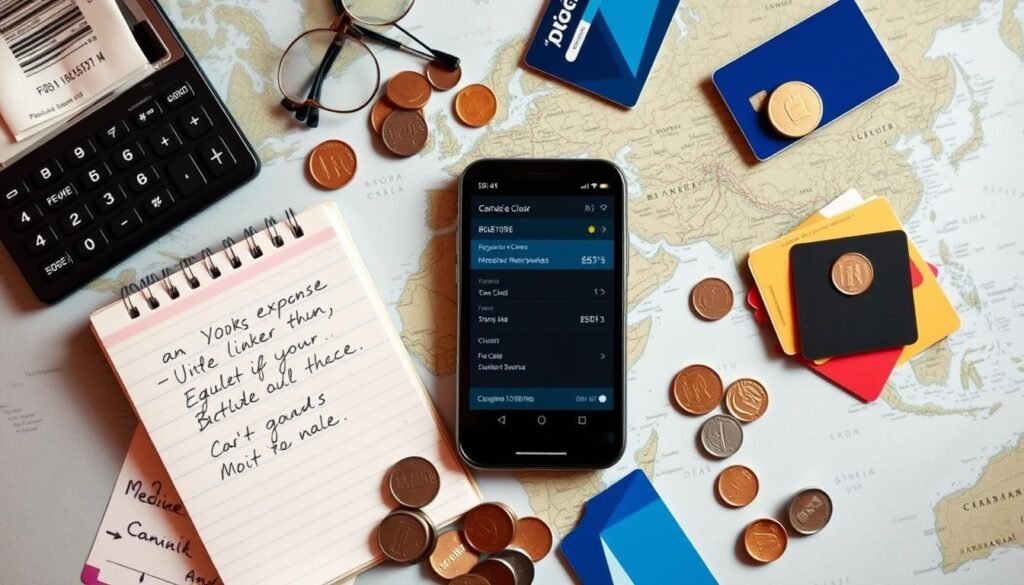
By incorporating these strategies into your business travel routine, you can better manage your travel expenses, make informed budgeting decisions, and ensure a smooth reimbursement process. Proactive expense management empowers you to focus on the core objectives of your business trip while maintaining financial discipline.
Packing Essentials for Business Travelers
When it comes to business travel, packing the right essentials can make all the difference in ensuring a smooth and productive trip. From professional attire to crucial gadgets and personal items, a well-curated packing list is key to navigating the demands of corporate travel.
To help you prepare for your next business trip, we’ve compiled a list of must-have items to include in your travel bag:
- Versatile business attire: Invest in a few high-quality, wrinkle-resistant pieces that can be easily mixed and matched for various meetings and events.
- Laptop and chargers: Ensure you have your laptop, along with all necessary cables and adapters to keep your devices powered up.
- Noise-canceling headphones: These can be a lifesaver for productive work time on the road, whether during flights or in hotel rooms.
- Portable power bank: Keep your phone, tablet, and other electronics charged with a reliable power bank.
- Travel documents: Don’t forget your passport, business cards, and any necessary travel visas or permits.
- Personal care items: Pack travel-sized toiletries, medications, and any other personal essentials to maintain your routine while away from home.
By packing these business travel essentials, you’ll be well-equipped to navigate the demands of corporate travel and focus on the important work at hand.
| Essential Item | Why It’s Important |
|---|---|
| Wrinkle-resistant business attire | Ensures a polished, professional appearance for client meetings and events |
| Portable electronics and chargers | Enables productivity and communication on the go |
| Noise-canceling headphones | Helps you focus and stay productive in noisy environments |
| Personal care items | Maintains your routine and comfort while traveling |
By carefully curating your business travel packing list, you can embark on your next corporate travel adventure with confidence and efficiency.
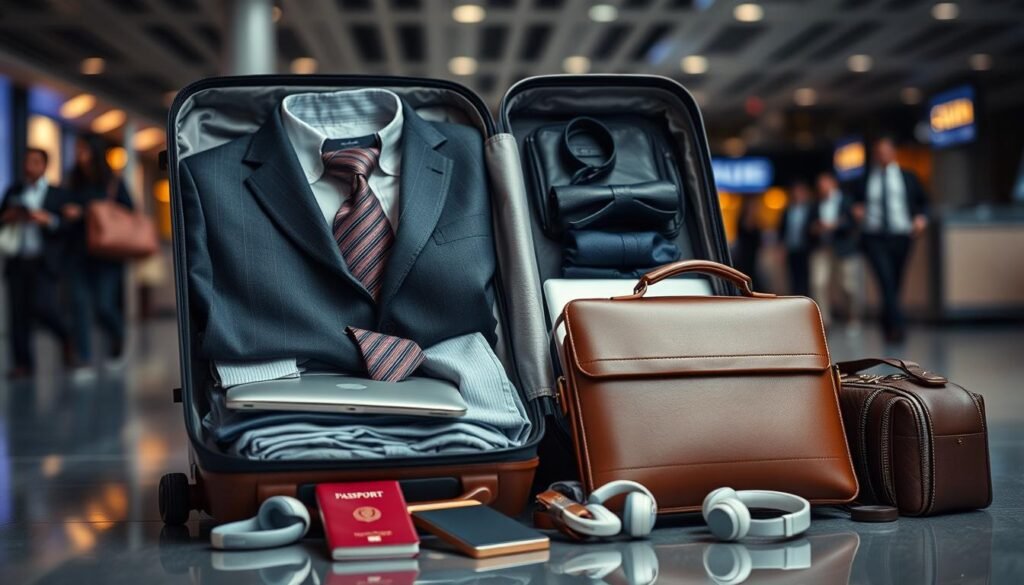
Navigating Different Business Cultures
In the dynamic world of cross-cultural business, understanding cultural norms and building strong rapport are essential for success. Whether you’re exploring new international markets or fostering relationships with clients from diverse backgrounds, adapting to local customs and communication styles can make all the difference.
Understanding Cultural Norms
When traveling for business, it’s crucial to be mindful of cultural differences and adapt accordingly. From greeting protocols and personal space to business etiquette and decision-making processes, each region has its own set of unwritten rules. Researching the local culture, observing body language, and being open-minded can help you navigate these nuances and avoid potential misunderstandings.
Building Cross-Cultural Rapport
Establishing genuine connections with your business partners is key to building long-lasting relationships. Cross-cultural awareness and a willingness to learn about their customs can go a long way in fostering trust and collaboration. Engage in meaningful conversations, be respectful, and adapt your communication style to suit their preferences. By demonstrating cultural sensitivity and a genuine interest in their experiences, you can forge strong cross-cultural business relationships.
| Cultural Aspect | North America | Europe | Asia |
|---|---|---|---|
| Greetings | Firm handshake, direct eye contact | Formal, with a nod or subtle bow | Slight bow, avoiding direct eye contact |
| Time Perception | Focused on punctuality and schedules | More flexible, may start late | Emphasis on patience and relationship-building |
| Decision-Making | Individualistic, fast-paced | Consensus-driven, thoughtful | Hierarchical, with respect for seniority |

By navigating cultural differences and building genuine cross-cultural rapport, you can pave the way for successful business collaborations and open up new opportunities in the global marketplace.
Travels and Business: Striking the Right Balance
As business travelers, finding the right balance between our professional obligations and personal well-being is a constant challenge. While work-life balance is crucial for overall productivity and job satisfaction, the demands of business travel can often disrupt this delicate equilibrium. In this section, we’ll explore practical strategies to help you maintain a healthy lifestyle and maximize your productivity on the road.
One of the keys to striking the right balance is setting clear boundaries. Before embarking on a business trip, take the time to communicate your schedule and commitments to family and friends. This will help manage expectations and ensure that your personal obligations are met, even while you’re away.
- Establish a routine and stick to it: Wake up and go to bed at consistent times, and carve out time for exercise, healthy meals, and relaxation.
- Leverage technology to stay connected: Use video calls and messaging apps to maintain regular contact with loved ones, ensuring they feel included in your journey.
- Prioritize self-care: Don’t neglect your physical and mental well-being. Make time for activities that recharge and rejuvenate you, such as meditation, reading, or exploring the local culture.
By incorporating these practices into your business travel routine, you’ll not only boost your overall sense of well-being but also enhance your productivity and performance. After all, a focused and energized professional is a far more valuable asset to any organization.
“The key is to find a balance that allows you to be fully present, whether you’re on the road or at home.”
Ultimately, striking the right work-life balance during business travel is about establishing healthy habits, setting boundaries, and embracing the flexibility and opportunities that come with being a global professional. By prioritizing your personal and professional needs, you’ll find that you can thrive both on the road and in your personal life.

Corporate Travel Policies and Compliance
As corporate professionals, adhering to travel policies and compliance requirements is essential for both the traveler and the organization. Corporate travel policies help ensure cost-effective and risk-mitigated business travel, while travel compliance safeguards the company’s interests and maintains a professional image.
Understanding and following these guidelines can be a crucial factor in the success of your business trips. From booking accommodations and transportation to expense reporting, compliance with corporate travel policies and business travel guidelines demonstrates your commitment to the organization and its best practices.
- Familiarize yourself with your company’s travel compliance policies and procedures.
- Adhere to approved booking channels and suppliers to maintain cost control and visibility.
- Accurately document and submit all travel-related expenses for timely reimbursement.
- Communicate any deviations or challenges to your travel coordinator or manager promptly.
| Key Compliance Areas | Best Practices |
|---|---|
| Booking Accommodations | Use preferred hotel vendors, compare rates, and book within policy guidelines. |
| Transportation | Utilize approved car rental agencies, ride-sharing services, or public transportation. |
| Expense Reporting | Maintain detailed records, submit claims promptly, and comply with reimbursement policies. |
By aligning your business travel with corporate policies and compliance requirements, you can demonstrate your professionalism, optimize costs, and contribute to the overall success of your organization’s operations.

“Compliance with corporate travel policies not only protects the company but also reflects positively on the individual traveler.”
Leveraging Technology for Seamless Travel
The world of business travel has been transformed by advancements in technology. Savvy travelers can now leverage a vast array of travel apps and online resources to streamline their journeys, boost productivity, and enhance their overall travel experience.
Travel Apps and Online Resources
From booking flights and accommodations to managing expenses and staying connected, there’s an app for nearly every aspect of the business travel experience. Popular travel apps like TripIt, Expensify, and Concur can help travelers organize their itineraries, track spending, and submit reimbursement claims with ease.
- TripIt: Consolidates all travel details into one master itinerary, making it easy to stay on top of flight, hotel, and rental car bookings.
- Expensify: Automates expense tracking and reporting, allowing travelers to snap photos of receipts and submit expense reports directly from their smartphones.
- Concur: Provides a comprehensive platform for booking travel, managing expenses, and ensuring compliance with corporate travel policies.
In addition to mobile apps, a wealth of online resources are available to assist business travelers. Websites like Kayak, Expedia, and Google Flights can help compare prices and find the best deals on flights, hotels, and car rentals.
Remote Work and Virtual Meetings
The COVID-19 pandemic has accelerated the adoption of remote work and virtual meetings, making it easier for business travelers to stay connected and productive while on the road. Tools like Zoom, Microsoft Teams, and Google Meet enable seamless video conferencing, screen sharing, and collaboration, allowing travelers to participate in meetings and collaborate with colleagues regardless of their physical location.
“The ability to work remotely has become essential for business travelers, as it allows them to stay productive and engaged with their teams even when they’re away from the office.”
By leveraging the latest travel technology and remote work capabilities, business travelers can streamline their journeys, enhance their productivity, and ensure they remain connected with their colleagues and clients, no matter where their travels take them.
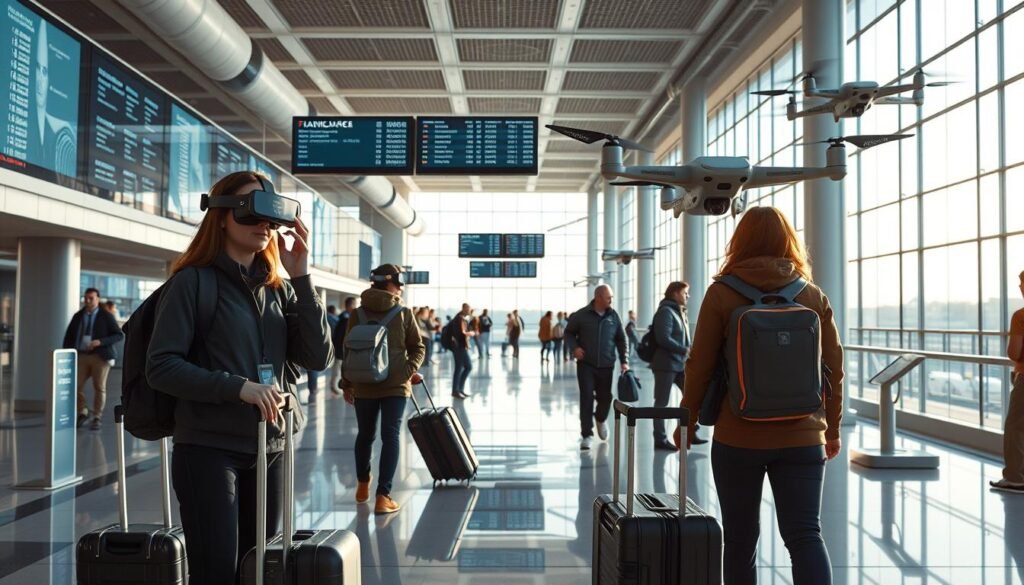
Maximizing Productivity on the Road
As seasoned business travelers, we know that maintaining high levels of productivity while on the move can be a constant challenge. However, with the right strategies and best practices, you can optimize your time and ensure that your business travel is both efficient and rewarding.
One of the keys to maximizing productivity is effective time management. When you’re on the road, it’s easy to get caught up in the constant stream of emails, phone calls, and unexpected interruptions. To combat this, try to create a structured schedule that allows you to focus on your most important tasks during your business trip.
- Prioritize your to-do list and tackle the most critical items first.
- Block out dedicated time for deep work, free from distractions.
- Leverage productivity apps and tools to keep you on track.
Another crucial aspect of staying productive during business travel is minimizing distractions. Whether it’s the temptation to check social media or the lure of the in-room entertainment system, it’s essential to create an environment that fosters concentration and focus.
| Productivity Tip | Description |
|---|---|
| Establish a Distraction-Free Zone | Designate a specific area in your hotel room or co-working space as a dedicated workspace, free from clutter and personal items that could divert your attention. |
| Leverage Noise-Cancelling Technology | Invest in a good pair of noise-cancelling headphones or earbuds to help you tune out ambient noise and stay focused. |
| Limit Social Media and News Consumption | Set specific times for checking your social media accounts and staying up-to-date on the news, rather than allowing it to disrupt your workflow. |
By implementing these strategies and maintaining a disciplined approach, you can unlock your full potential and make the most of your business travel experiences. Remember, the key to maximizing productivity on the road is finding the right balance between work and personal well-being.
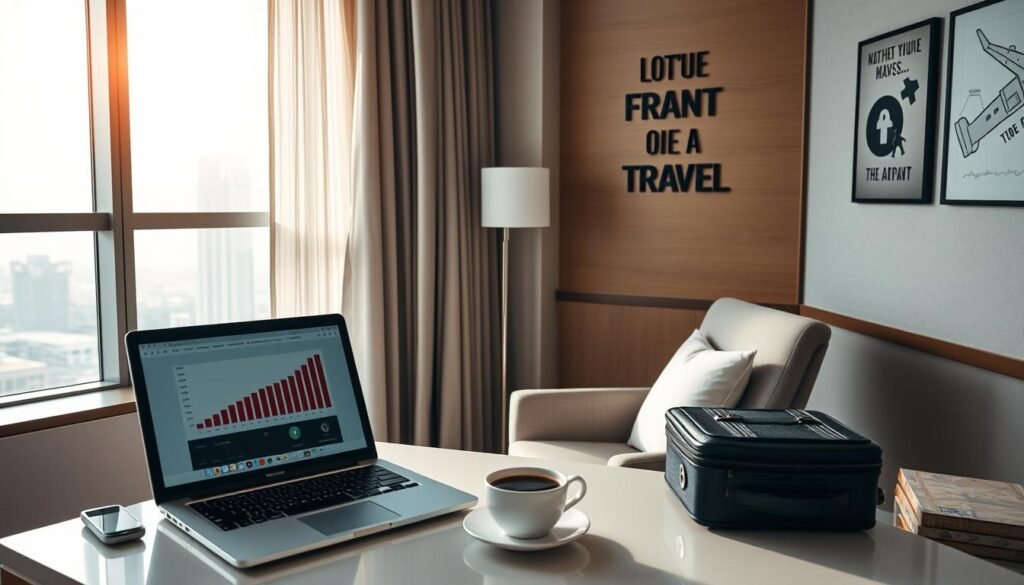
Travel Safety and Security Measures
As business travelers, ensuring your safety and security should be a top priority. Effective risk management and proactive contingency planning can help you navigate various travel challenges and mitigate potential threats. By understanding the risks and implementing personal safety strategies, you can embark on your business trips with confidence and peace of mind.
Risk Assessment and Contingency Planning
Before embarking on any business trip, it’s crucial to conduct a thorough risk assessment. Identify potential risks such as political instability, natural disasters, or health emergencies in your destination. Develop a comprehensive contingency plan that outlines your course of action in case of emergency. This may include emergency contact information, evacuation procedures, and backup communication methods.
Personal Safety Tips
- Research your destination and familiarize yourself with the local laws, customs, and transportation options.
- Pack essential safety items like a portable charger, first-aid kit, and personal protective equipment.
- Stay vigilant in public places and avoid flaunting valuable belongings.
- Use reputable accommodation providers with robust security measures.
- Keep your company’s travel security policies and emergency protocols readily available.
| Travel Safety Measure | Benefit |
|---|---|
| Conducting Risk Assessment | Identifies potential threats and enables proactive planning |
| Developing Contingency Plans | Ensures you are prepared to respond effectively in case of emergencies |
| Implementing Personal Safety Practices | Enhances your security and reduces the likelihood of incidents |
By prioritizing travel safety, risk management, and personal safety, you can embark on your business trips with confidence, focus on your objectives, and ensure a secure and productive experience.
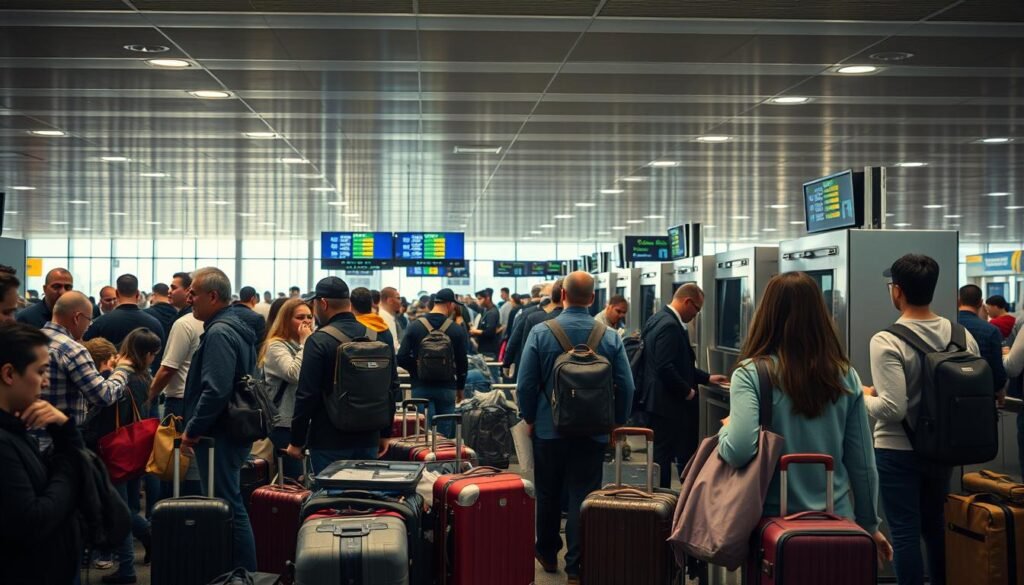
“Successful business travel requires proactive risk management and a commitment to personal safety. Protect your well-being and your company’s interests by prioritizing these essential elements.”
Sustainable Business Travel Practices
As the world becomes increasingly conscious of environmental sustainability, businesses are recognizing the importance of adopting eco-friendly practices, including in their travel policies. Sustainable travel has emerged as a priority for many organizations, enabling them to reduce their carbon footprint and contribute to a greener future.
One of the key ways business travelers can embrace sustainable travel is by considering greener transportation options. This could involve opting for public transportation, such as trains or buses, or exploring alternative modes like electric vehicles or bicycles, depending on the destination and the nature of the trip. Additionally, being mindful of air travel and offsetting carbon emissions can make a significant impact.
- Choose eco-friendly transportation options
- Prioritize rail or bus travel over air travel when feasible
- Offset carbon emissions from air travel
Another important aspect of eco-friendly travel is minimizing waste and supporting local communities. Business travelers can achieve this by avoiding single-use plastics, packing lightly, and patronizing local businesses and services during their trips. This not only reduces the environmental impact but also provides a more authentic and enriching travel experience.
- Avoid single-use plastics and excessive waste
- Pack light and consciously
- Support local businesses and communities
By embracing sustainable business travel practices, organizations can demonstrate their commitment to environmental stewardship and social responsibility, ultimately contributing to a more sustainable future for all.

“Sustainable travel is not just about reducing our environmental impact; it’s about creating a more mindful, authentic, and enriching travel experience for all.”
Building a Loyal Customer Base Through Travel
In the world of business, customer relationships are the foundation for sustainable growth. When it comes to fostering these crucial connections, business travel can be a powerful tool. By strategically leveraging corporate trips, companies can engage with clients in a more meaningful way, demonstrating their value and ultimately building a loyal customer base.
One of the key advantages of using business travel to strengthen client engagement is the opportunity it presents for face-to-face interactions. Whether it’s a sales pitch, a product demonstration, or a collaborative working session, in-person meetings can help nurture stronger bonds and deepen understanding between the company and its clients. This personal touch can be particularly valuable in industries where customer relationships are paramount.
Additionally, business travel can be leveraged to showcase a company’s commitment to its clients. By inviting key customers to exclusive events, such as industry conferences or company-hosted activities, businesses can demonstrate their dedication to their client’s success and foster a sense of partnership and exclusivity.
| Strategies for Building Loyalty Through Business Travel | Benefits |
|---|---|
|
|
By strategically leveraging business travel to build meaningful customer relationships and foster client engagement, businesses can establish a loyal customer base that drives long-term success and growth.

“The true value of business travel lies in its ability to forge lasting connections and deepen the bonds between a company and its clients.”
Networking Opportunities in Business Travel
When it comes to business travel, the opportunities for networking and building valuable business connections are truly remarkable. As professionals navigate the world, they’re presented with unique chances to expand their professional development and explore new avenues for growth.
Attending industry events, conferences, and trade shows while on the road can be a game-changer. These gatherings often bring together like-minded individuals, allowing travelers to connect with peers, learn about the latest trends, and potentially uncover new business partnerships. By actively engaging in these networking opportunities, professionals can cultivate meaningful relationships that can lead to future collaborations and strategic alliances.
Moreover, simply being in a new city or country can open the door to serendipitous encounters. Striking up conversations with fellow travelers, local business owners, or industry experts can lead to unexpected discoveries and valuable insights. These chance encounters can often blossom into lasting business connections that can drive innovation and growth.
“Networking is not about just connecting people. It’s about connecting people with people, people with ideas, and people with opportunities.”
– Michele Jennae
To make the most of these networking opportunities, it’s essential for business travelers to approach their journeys with an open mindset and a willingness to step outside their comfort zones. By actively seeking out opportunities to connect, learn, and collaborate, they can unlock a world of possibilities that can transform their professional development and the success of their organization.

In the end, business travel is not just about the destination; it’s about the connections made along the way. By embracing the networking potential inherent in their journeys, savvy professionals can cultivate a powerful web of business connections that can propel their careers and their organizations forward.
Conclusion
As we’ve explored throughout this comprehensive guide, the intersection of travels and business is a crucial aspect of modern-day corporate success. By mastering the strategies and best practices outlined in this article, business travelers can enhance their productivity, optimize their expenses, and create meaningful connections that drive their organizations forward.
Whether you’re fostering client relationships, expanding into new markets, or seeking to build a loyal customer base, the art of business travel has become an indispensable part of the corporate landscape. From navigating different business cultures to leveraging the latest travel technologies, the savvy business traveler can unlock a world of opportunities and propel their company to new heights.
As you embark on your next business trip, remember the key insights shared here: plan meticulously, manage your expenses wisely, prioritize safety and sustainability, and seize every networking opportunity that comes your way. By embracing the challenges and embracing the advantages of travels and business, you can unlock a new level of success and propel your corporate travel endeavors to new heights.
FAQ
What are the key benefits of business travel?
Business travel plays a crucial role in fostering client relationships and exploring new market opportunities. Face-to-face interactions with clients can help build trust, personalize interactions, and solidify partnerships. Traveling to new locations also allows businesses to gain firsthand insights into emerging markets and identify potential growth opportunities.
How can I effectively plan a business trip?
Effective planning is the key to a successful business trip. This includes booking transportation and accommodations, coordinating schedules, and ensuring compliance with corporate travel policies.
How can I manage my travel expenses effectively?
Careful management of travel expenses is essential for both the traveler and the company. This includes creating travel budgets, choosing cost-effective accommodation and transportation options, and implementing effective expense tracking systems for reimbursement.
What are the essential packing tips for business travelers?
Packing the right essentials can make a significant difference in the overall experience of a business trip. This includes packing professional attire, necessary gadgets, and personal items to ensure a smooth and productive trip.
How can I navigate different business cultures during my travels?
When traveling for business, it’s essential to be mindful of and adapt to different cultural norms and practices. This includes understanding cultural nuances, building cross-cultural rapport, and navigating various business etiquette to ensure successful interactions and collaborations.
How can I maintain a healthy work-life balance while traveling for business?
Maintaining a healthy balance between business travel and personal life is crucial for overall well-being and productivity. This includes strategies for optimizing work-life balance, setting boundaries, and ensuring that business trips don’t interfere with personal commitments.
What are the key corporate travel policies and compliance requirements I need to be aware of?
Adhering to corporate travel policies and compliance requirements is essential for both the traveler and the organization. This includes understanding and following these policies to ensure cost-effective and risk-mitigated business travel.
How can I leverage technology to enhance my business travel experience?
Advancements in technology have transformed the business travel experience, providing numerous tools and resources to streamline the process. This includes leveraging travel apps, online platforms, and remote work capabilities to enhance productivity and efficiency during business trips.
What strategies can I use to maximize my productivity while on the road?
Maintaining high levels of productivity while traveling for business can be a challenge. This includes strategies and best practices for managing time, minimizing distractions, and ensuring that business travelers can accomplish their goals while on the move.
How can I ensure the safety and security of my business travels?
The safety and security of business travelers is of paramount importance. This includes conducting risk assessments, developing contingency plans, and implementing personal safety measures to ensure a secure and worry-free business travel experience.
What sustainable business travel practices can I adopt?
As sustainability becomes an increasingly important priority for businesses, this includes adopting more eco-friendly practices, such as choosing greener transportation options, reducing waste, and supporting local communities during business trips.
How can I use business travel to build a loyal customer base?
Business travel can be a powerful tool for nurturing and strengthening customer relationships. This includes strategies for using corporate trips to engage with clients, demonstrate value, and foster long-term loyalty, ultimately driving business growth.
What networking opportunities can I explore during business travel?
Business travel often presents unique opportunities to expand professional networks and forge valuable connections. This includes strategically leveraging time on the road to attend industry events, connect with peers, and explore new business partnerships.

